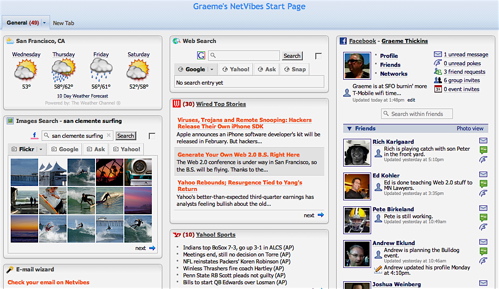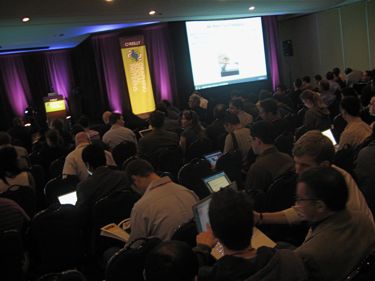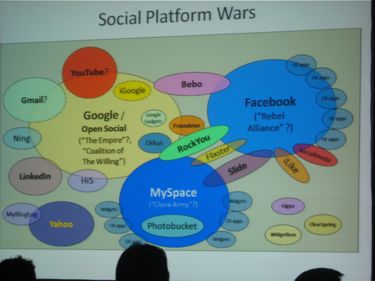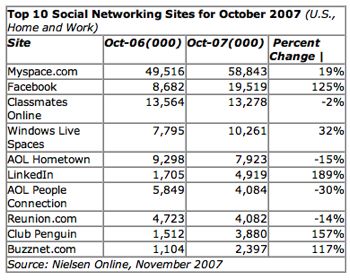It was a full day of panels and speakers, but it almost seemed to fly by. Lots of content! But it sure as hell held my attention. The last panel of Day 1, as it turned out, was the first chance to focus on The Big FB — the elephant in the room, shall we say? We didn’t get to hear yet from anyone at the company itself (that would come the next day), but we did from three very well known external developers of Facebook apps: one big company (eBay) and two smaller/startup firms (Renkoo and Openhive).
Renkoo’s success with its "Boozemail" app was accidental, said CTO Joyce Park. Her company first thought its functionality was too sophisticated for Facebook. But they decided to give it a try and reasoned there was a common interest out there in one big thing — drinking! 
They had modest expectations for their app, but, in a litle more than three months, it’s been used — are you ready? — 120,000,00 times. Now, Park said, her firm is even looking to "export it everywhere" — meaning, beyond Facebook(?). Yes, as you might imagine, they’re developing "branded drink icons" for the liquor industry (for use only by people aged 21 and above, of course). One problem, though: the liquor companies don’t like the word "booze," so the implication was that, wherever else the app may be used, it may have a different name. Park also showed a brand-new app Renkoo was introducing at Widget Summit: "HaikuZoo," which is an app for sharing virtual pets. Yes, friends, you can even buy decorations for your pets’ profiles. Is this a great country, or what?
Rolf Skyberg of eBay jumped in next — the guy with the best darn title at the whole place: "Disruptive Innovator." Rolf talked about his firm’s ‘eBay To Go’ Facebook app, which lets you personalize your Facebook profile with something you want to share that’s on eBay; he said "we’re now calling this one a widget." 
He also talked about ‘eBay Marketplace’ — an app that displays what I’m looking for (interested in buying), what I’m selling, and who my friends are on Facebook.
"Widgets are part of our strategy to put eBay where the people
are," said Skyberg. He noted that his firm is now publishing APIs, and
even paying people to develop apps. That appears to be the case with a new one Rolf mentioned, called Giftbay.
The remaining panel member was Ryo Chijiiwa, CEO of Openhive, who
was a late add. He showed an app that lets people share their book
collections. He said he launched it within a week of the Facebook
Platform launch. But he said it wasn’t viral enough — for three
reasons. The app wasn’t inherently social, it lacked lightweight
features, and it was too complicated. So, I’ll be damned if I know why
he was on the panel if this was the case — but he talked so softly I
couldn’t understand a thing he said from this point on. So, you figure it
out. I couldn’t even find his app on Facebook. Maybe it
self-destructed? …dying that oh-so-painful death of (hush) non-virality.
Naill Kennedy started asking followup questions: "Joyce, yours isn’t the only drinking app on Facebook — what’s your differentiation?" To which the CTO of Renkoo responded: "I think maybe Happy Hour (another app) went overboard with virality. They force you to spam a lot of your friends." How are eBay’s apps different? "We’re looking for people who are active on both sites," said Skyberg. "There’s lots of ‘stuff’ that defines people."
Moderator Kennedy: "Are you worried about brand dilution on Facebook?" (a reference to the many eBay-related third-party apps there now) "Most of the the apps now are about search," said Skyberg. "We wanted to add things that will really bring the two communities together."
In the audience questions later, someone asked about commerce apps. "I don’t think there are many good apps on Facebook for that," said Renkoo’s Park. "I mean, isn’t it kind of creepy to buy your friends’ stuff?" Yeah, I guess how do you ask for a refund if it isn’t as-advertised… But the best audience question of them ALL was the last one: "Have you thought about cross-integration of your apps? For example, can you send booze to your virtual pets?" To which Rekoo’s Park, seemingly missing the humor, answered: "No, that disturbed people." Making it sound like they actually did consider it… 🙂
In a brief session following, three new companies/services gave quick pitches: WebWag did a cool demo of its Widget-On-Demand feature, grabbing a stock section off the MarketWatch site (GOOG, of course) and creating a widget of it for his home page — in about five seconds. Gydget creates cool fan widgets — great for bands, sports teams, and the like (here’s some coverage). And NetVibes, a sponsor of the event, announced it now supports more widget platforms (including iPhone), so your can write your NetVibes widgets once and run them everywhere. 
They also let you localize for different languages. Their new widget for Facebook is pretty cool, too — I put it on my NetVibes start page. (Right side of creenshot.) NetVibes was sponsoring the reception, which we were all now ready to bolt for….
UPDATE (10/17, 7:40 am Pacific): To add link to story about Gydget.
UDATE (10/17, 3:25 pm Pacific): To add more content.







 So, let’s start giving advertisers the ability to pinpoint their ads at just the specific individuals on Facebook, within certain very narrow demographics, that will most be interested in the product or service they’re advertising. Such, after all, is the Holy Grail of marketers everywhere. And, by golly, Facebook sure does seem to be a place where a glorious experiment like this could be carried out.
So, let’s start giving advertisers the ability to pinpoint their ads at just the specific individuals on Facebook, within certain very narrow demographics, that will most be interested in the product or service they’re advertising. Such, after all, is the Holy Grail of marketers everywhere. And, by golly, Facebook sure does seem to be a place where a glorious experiment like this could be carried out.
Recent Comments